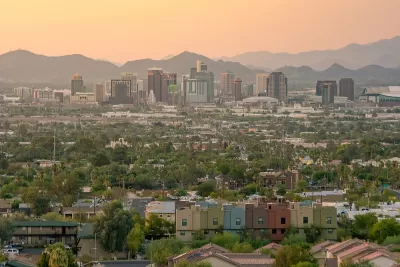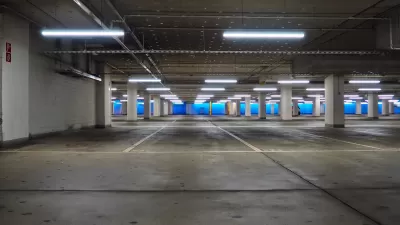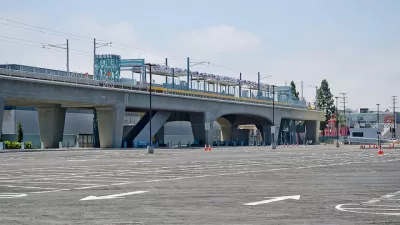In addition to lower citywide parking requirements on residential properties, a proposed law in Phoenix would lower minimum parking requirements even further for affordable housing developments near the city’s light rail system.

Phoenix planners are preparing a new law that would ease parking requirements for residential development around the city as well as transit oriented development near the city’s light rail system, with the Phoenix City Council expected to make a decision on the proposed zoning changes in September.
The proposed changes to the city’s parking requirements “would lower that bottom floor [set by minimum parking requirements] across the city but lower it even further for affordable housing complexes and developments in the Gateway, Eastlake-Garfield, Midtown, Uptown and Solano neighborhoods, which surround light rail,” according to a pawywalled article by Taylor Seely for the Arizona Republic.
“Under the new law, a 100-unit apartment complex in one of those five communities near light rail could see the requirement lower from 113 required spaces to 50 spaces. If it's an affordable complex in one of those communities, the parking quota would, in most cases, fall to zero,” adds Seely. “A 100-unit complex elsewhere in the city would go from 150 spaces to 125 spaces. If it's an affordable complex but not near light rail, it would go from 150 required spaces to 63.”
The source article notes that parking reform is increasingly popular in U.S. cities, listing Minneapolis, Portland, and Austin as examples.
The article lays out the arguments of supporters and opponents of the new law. Seely says residents “by and large” oppose the change, but implies that opponents might not be able to sway members of the Phoenix City Council from supporting the new law.
FULL STORY: Phoenix considers allowing fewer parking spaces for apartments in push for public transit [pawywall]

Planetizen Federal Action Tracker
A weekly monitor of how Trump’s orders and actions are impacting planners and planning in America.

DARTSpace Platform Streamlines Dallas TOD Application Process
The Dallas transit agency hopes a shorter permitting timeline will boost transit-oriented development around rail stations.

Congressman Proposes Bill to Rename DC Metro “Trump Train”
The Make Autorail Great Again Act would withhold federal funding to the system until the Washington Metropolitan Area Transit Authority (WMATA), rebrands as the Washington Metropolitan Authority for Greater Access (WMAGA).

Supreme Court Ruling in Pipeline Case Guts Federal Environmental Law
The decision limits the scope of a federal law that mandates extensive environmental impact reviews of energy, infrastructure, and transportation projects.

Texas State Bills to Defund Dallas Transit Die
DART would have seen a 30% service cut, $230M annual losses had the bills survived.

Bikeshare for the Win: Team Pedals to London Cricket Match, Beats Rivals Stuck in Traffic
While their opponents sat in gridlock, England's national cricket team hopped Lime bikes, riding to a 3-0 victory.
Urban Design for Planners 1: Software Tools
This six-course series explores essential urban design concepts using open source software and equips planners with the tools they need to participate fully in the urban design process.
Planning for Universal Design
Learn the tools for implementing Universal Design in planning regulations.
Roanoke Valley-Alleghany Regional Commission
City of Mt Shasta
City of Camden Redevelopment Agency
City of Astoria
Transportation Research & Education Center (TREC) at Portland State University
US High Speed Rail Association
City of Camden Redevelopment Agency
Municipality of Princeton (NJ)





























